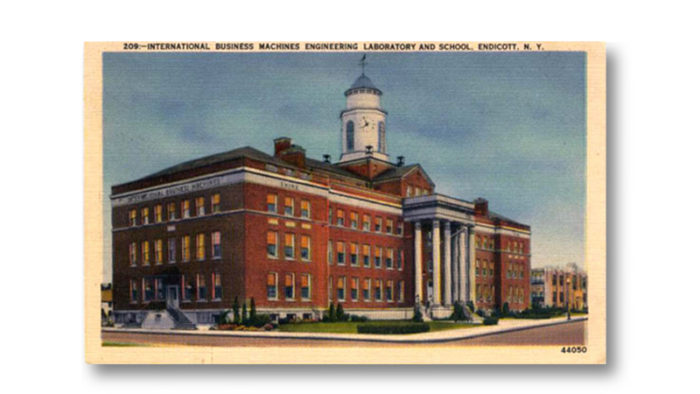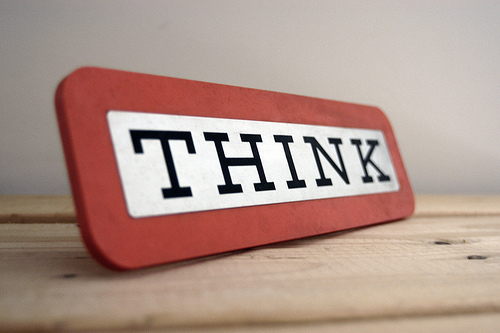by James Palombo
Politics Editor
I grew up in Endicott, New York, a small town that had a big-time connection to the corporate world. This connection was International Business Machines – in fact IBM had its largest manufacturing plant just a few minutes’ walk from my house. It’s where my father, sister, aunt and two uncles worked, and particularly in the 1950s’ and 60s’, it was a place that many young people had their future aspirations tied to.
Importantly, particularly in terms of this current piece, the company’s logo was “THINK.” Much of what was happening then was tied to the beginnings of the technological revolution, so this seemed a most appropriate symbol for what should be happening within a corporation like IBM. The logo’s effect was made even more poignant as IBM attached it to the clocks they continued to produce, to their corporate magazine and to many of the corporate initiatives and activities they sponsored. So it’s no surprise that throughout my career as an educator the logo remained significant, as it represented what should be going on in people’s heads, especially in the kind of progressive and powerful society that we seemed to be.
However, I have to say that holding the logo out as a standard of sorts has not turned out as I anticipated. In short, I’ve grown continually more worried that the true essence of the word has gotten lost in translation. In other words, it seems that many in our society have simply forgotten what “thinking” actually implies. And the resulting circumstances are – well, just look outside your door, I believe what you see speaks for itself.
The troublesome situation is no more evident than in our current presidential campaigns. In other words, are any of the candidates pushing us to think beyond what our mere opinions have led us to? And to what extent are their campaigns designed to placate – to eliminate – rather than educate? Thinking is not meant to stop at satisfying one’s own personal likes and dislikes. It’s work, hard work. It’s a process meant to carry one deeper into the actual meanings and nuances of issues, to measure principles like fairness, justice, equality and freedom on both individual and societal levels. Yet, as we look at the political exchanges, the segues and sideways motion of what is and isn’t said, and when we consider the cheering and jeering taking place, one can hardly believe that any real, honest-to-goodness thinking is occurring. (Isn’t it tiresome to hear the candidates polish the apple of the public’s intellect when most of us realize how little we, the public, actually know?)
Take the Trump campaign, for example. How can people believe in what this self-indulgent, wealthy carnival barker is actually putting forth? Are they thinking their way through his promises to simply bully the country back to some far-gone day that in all thinking honesty, never was? And what about the Sanders and Clinton campaigns? Why is that Bernie, in his critique of the Wall Street mentality, has not explained the link between socialism and capitalism, that the meaning of the former derives its definition from Karl Marx’s critical analysis of the latter? Is he afraid that he won’t get votes by attaching to this fact? And doesn’t this non-connect effect his credibility? And speaking of the concerns tied to the nature of capitalism, how is that Hillary can promise to clean up the damage of a capitalist system when she refuses to acknowledge the system for what it is, while not refusing the money from that same machine which coincidentally has been feeding her campaign efforts? What does this say about her integrity? With these considerations in mind any thinking person would conclude that all sides are just taking advantage of an unsuspecting, unthinking public, hoping that the populace doesn’t think too much in connecting their opinions to a vote. This may simply be politics “as usual” yet it’s hard to believe that this is what we’ve come to, after all the years of struggle and work, and as importantly, good fortune!
To be fair, maybe thinking, particularly in a critical, civic sense (as opposed to a technological sense), has not been stressed enough in our society. Maybe we’ve gotten more civically fat in the head just as we have gotten fatter in the belly because we have not pushed enough to exercise our thinking capabilities. And maybe in the course of getting fatter we’ve grown lazier. It’s interesting to consider that perhaps our “lazy fatness” is related to the cultural instincts developed as our country got more and more prosperous, too consumption oriented, and too much centered on the “me” and not the “we.” And perhaps the result of people existing in this milieu, especially when left to their own devices in policing themselves, is not as healthy a society as we might have thought – that is, if we were actually thinking about this at all.
Even if only half-true, the situation begs the question as to where we might turn. Or, are we left in some thoughtless void, never to escape, never to be seen in the form we want so desperately to be seen in? Given the vexing character of our less-than-admirable leadership, is this condition our fate? Is what we are now experiencing to be the net result of the grand “American experiment?”
Despite the current malaise, I can’t help but THINK that this is not the case. I THINK that what we are seeing in our current darkness is an effort to get to the light – in other words, there is a way out. In this context I would suggest, as I have in the past, that we are in the throes of a perilous, collective identity crisis, and that our way out lies in the form of some serious civic educational initiatives. In other words, a broadening of our citizen education needs to take place, one focused on bringing the secondary, post-secondary, adult education processes together to create more comprehensive, civic-related dialogue. In this sense we can bring together, without any partisan themes, all levels of economic, political, social and spiritual concerns for discussion purposes, a process that will result in a better informed, more thoughtful citizenry.
Perhaps this type of effort will come from the formation of a new political party, borne from the fragments of what we see before us. This could spell a new style of leadership, one that has public education as one of its primary goals, a goal that will clear the air, not confuse us more. Whatever the case, education may be our best way out. And if we honestly THINK about it, we can all reason that it’s simply our best way forward. As the old IBM logo might suggest, the clock is ticking.



Recent Comments